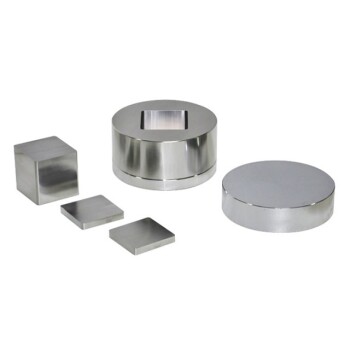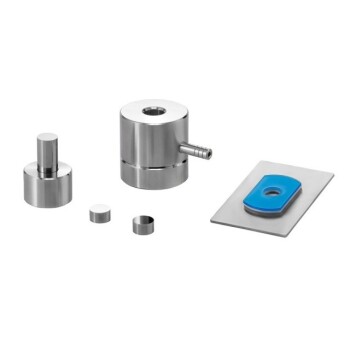At its core, regular maintenance for a lab pellet press is not merely a chore; it is an essential practice for ensuring the equipment's longevity, operational safety, and—most critically—the accuracy and reliability of your results. Neglecting maintenance directly compromises the integrity of your work by introducing variables that undermine consistent performance.
Think of maintenance not as a cost, but as a form of quality control. A well-maintained press is a reliable scientific instrument; a neglected one is an unpredictable source of error.

The Pillars of Pellet Press Integrity
Regular maintenance can be broken down into three key areas of impact: the accuracy of your results, the lifespan of the equipment, and the safety of the operator. Each is directly tied to specific, routine actions.
Ensuring Consistent, Accurate Results
Your primary goal in the lab is producing reliable data. A pellet press with unaddressed issues can directly compromise this.
Consistent force application is paramount for creating uniform pellets. Regular calibration of force gauges ensures that the pressure you set is the pressure being delivered, eliminating a major source of sample-to-sample variability.
Furthermore, the press platens must be perfectly clean and parallel. Debris or residue can lead to uneven pressure distribution, creating flawed pellets that may crack or produce inconsistent analytical results.
Maximizing Equipment Longevity
A lab pellet press is a significant investment. Proactive maintenance is the most effective way to protect it and maximize its operational life.
Friction is the primary enemy of mechanical systems. Proper lubrication of all moving parts according to the manufacturer's schedule is the single best way to reduce wear and tear.
The hydraulic system is the heart of the press. Routinely inspecting for leaking hoses or seals and replacing hydraulic fluids with the correct type prevents contamination and protects internal components from premature failure.
Preventing Failures and Safety Risks
A malfunctioning press is not just an inconvenience; it can be a serious safety hazard.
Small issues can cascade into major failures. Regular visual inspections allow you to spot warning signs like structural cracks in the frame or excessive vibration during operation, which can indicate serious internal problems.
Hydraulic fluid is under immense pressure. A leaking hose can pose a slip hazard or, in a catastrophic failure, a dangerous high-pressure injection risk. Routine inspections are your first line of defense.
The Hidden Costs of Neglect
While maintenance requires an investment of time, neglecting it carries far greater costs in compromised data, expensive repairs, and potential safety incidents.
The Myth of "If It Isn't Broken"
This mindset is particularly dangerous for hydraulic equipment. A small, unnoticed fluid leak or a minor vibration may seem harmless, but they are often early symptoms of component stress that can lead to a sudden, costly breakdown.
Using Incorrect Materials
Using the wrong type of hydraulic fluid or lubricant can be just as damaging as using none at all. Always adhere strictly to the manufacturer's specifications to avoid degrading seals or compromising hydraulic performance.
Overlooking Calibration
An uncalibrated press is no longer a precision instrument. If you cannot trust the force reading on the gauge, you cannot trust the integrity of the pellets it produces, rendering your experimental results questionable.
A Practical Maintenance Checklist
To translate this understanding into action, tailor your maintenance focus to your most critical priority.
- If your primary focus is data integrity: Prioritize weekly cleaning of the press platens and scheduled calibration of the force gauge.
- If your primary focus is long-term ROI: Prioritize adherence to the lubrication schedule and proactive management of hydraulic fluids.
- If your primary focus is lab safety: Prioritize daily visual inspections for leaks, cracks, and any abnormal operational noises or vibrations.
Ultimately, consistent maintenance empowers you to control your equipment, ensuring it remains a reliable tool for discovery.
Summary Table:
| Maintenance Focus | Key Actions | Impact |
|---|---|---|
| Data Accuracy | Calibrate force gauges, clean platens | Ensures uniform pellets and reliable results |
| Equipment Longevity | Lubricate moving parts, inspect hydraulic systems | Reduces wear, prevents breakdowns |
| Safety | Check for leaks, cracks, and vibrations | Mitigates hazards and failures |
Ensure your lab's pellet press operates at peak performance with KINTEK's reliable lab press machines, including automatic lab presses, isostatic presses, and heated lab presses. Our equipment is designed for accuracy, durability, and safety, helping you achieve consistent results and protect your investment. Contact us today to learn more and get expert support tailored to your laboratory needs!
Visual Guide

Related Products
- Laboratory Hydraulic Split Electric Lab Pellet Press
- Laboratory Hydraulic Press 2T Lab Pellet Press for KBR FTIR
- Laboratory Hydraulic Press Lab Pellet Press Button Battery Press
- Manual Heated Hydraulic Lab Press with Integrated Hot Plates Hydraulic Press Machine
- Automatic Heated Hydraulic Press Machine with Hot Plates for Laboratory
People Also Ask
- What is the purpose of using a hydraulic press to form pellets from Li3N and Ni powder mixtures? Optimize Solid-State Synthesis
- What is the primary purpose of using a laboratory hydraulic press to form halide electrolyte powders into pellets before electrochemical testing? Achieve Accurate Ionic Conductivity Measurements
- What is the function of a laboratory press machine in preparing Li3V2(PO4)3 electrode pellets? Ensure Accurate Electrochemical Testing
- Why is it necessary to use a laboratory hydraulic press for pelletizing? Optimize Conductivity of Composite Cathodes
- Why is a high-precision laboratory hydraulic press necessary for sulfide solid-state electrolyte pellet preparation?



















